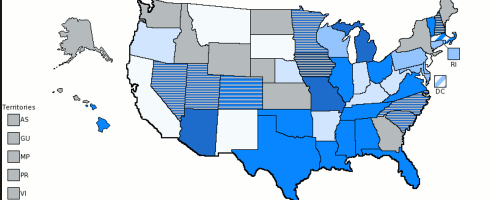- Let Iowa and New Hampshire continue holding nominating contests in early February.
- Then, sort all remaining states (and voting territories, like Guam) by size, and classify them into three tiers, with an approximately equal number of delegates at stake in each tier.
- All states in the first tier (the smallest states) vote on the second Tuesday in February.
- Tier two votes on the second Tuesday in March.
- Tier three votes on the second Tuesday in April. And then you can hold the conventions in May.
- Tiers 1 and 3 rotate places every four years.
WHY SHOULD WE ADOPT THIS SYSTEM?
The current primary system is a mess.
Almost every state is faced with a dilemma: 1) leave the primary where it is and resign oneself to a state of irrelevance, or 2) move the primary inexorably earlier, wasting millions, or even hundreds of millions of dollars (as in the case of California in 2008) just in the transaction costs of hosting Presidential primaries separately from local primaries. The alternative (moving all of the local primaries earlier and earlier every year) is likewise sub-optimally palatable.
The public are forced to coexist with an inexorably lengthening election cycle, in which national elections have become a near-constant phenomenon.
Those few states that take a moral stand and refuse to move their primary to gain influence are punished for it.
Finally, the primary system is lumpy. Some states’ primaries are all alone amidst a sea of media coverage. Others’ are all clogged into Super Tuesday.
It is, quite simply, a senseless mess. And, everyone knows it.
If everyone knows and agrees that it is a mess, then why hasn’t anyone changed it?
That’s a great question. One might similarly ask why Congress never seems to get around to passing budget bills until the government is brought to the brink of collapse. The simple answer is that a complex system with many stakeholders contains a lot of obstacles to doing things. Few states have a strong interest in reforming the primary system. But, the traditional first few states have a very large interest in retaining their primacy.
Plus, not everyone has coalesced around the same solution yet. A lot of people would like the states to all be equal. Iowa and New Hampshire want to retain their primacy. Some people think that the race fundamentally changes once the first couple of actual votes are cast and recorded, and so it is a good idea to put a couple of states without a ton of delegates a bit ahead of everyone else, so that the system has a chance to adjust to whatever happens and really vet the candidates. Some people want a drawn out primary, so that the candidates are more thoroughly vetted. Other people advocate a shorter primary, so that the eventual winner is less damaged by the time they go up against the opposition.
This system gets around those concerns.
By retaining Iowa and New Hampshire as the first states, this plan simultaneously avoids pissing off those states and retains the advantages of having a couple of states out front for early vetting. The inhabitants of both states are actually quite used to performing this job, and take cultural pride in it. Anyways, they really only have a few delegates between them, so it doesn’t make that much difference to everyone else.
Then, this system puts all of the other states on equal footing with eachother. Under this system, there are no states that are truly irrelevant, as there is a substantial possibility that any given competitive election will still be undecided by the time it gets to the third wave.
In the current system, campaign events are heavily concentrated in the first 4 states, and almost non-existent for states whose contests occur after Super Tuesday. This system would allow candidates to focus their efforts in states that are conducive to their message. All states would see campaign events.
By the same token, we should do away with the electoral college, and enter an era of true representative democracy.
